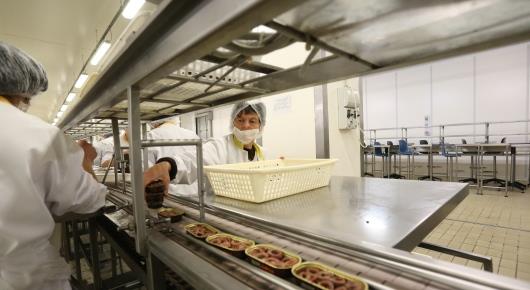Eastern Europe’s fisheries sector seeks access to lucrative international market

Fish and fish products are among the most widely traded food commodities in the world, with trade totaling around US$ 145 billion per year. Demand is especially strong in Europe. Market access and regional trade in fish products in Eastern Europe – especially with regard to the World Trade Organization – are the focus of a three-day workshop opening here today.
The regional capacity-building workshop – “WTO, Market Access and Fish Trade” – is organized by FAO, EUROFISH, Serbia’s Ministry of Agriculture, Forestry and Water Management, and the Chamber of Commerce and Industry of Serbia.
Representatives from Bosnia and Herzegovina, Georgia, the former Yugoslav Republic of Macedonia, Moldova, Montenegro, and Turkey will present and discuss case studies of fisheries-related regulations and policies in their countries.
“As the use of eco-labels has increased in major fish markets (now around 14 percent of all production), the number of seafood certification schemes has also increased,” said Victoria Chomo, FAO senior fishery and aquaculture officer. “This raises the potential for WTO dispute cases when eco-labels cross the line between voluntary standards and regulations.”
“It’s important to find solutions to market barriers in Europe,” Chomo added, “as trade issues in the fishery sector impact regional food security and the livelihoods of fish producers, processors, and exporters in the region.”
“As the use of eco-labels has increased in major fish markets . . .
the number of seafood certification schemes has also increased. This raises the potential for WTO dispute cases.”
Victoria Chomo
FAO senior fishery and aquaculture officer
Some of the major trade issues for the fisheries and aquaculture sector remain outside the realm of the World Trade Organization, Chomo said. Science-based food safety regulations, voluntary eco-labels, and catch documentation requirements to combat illegal, unreported and unregulated, or IUU, fishing are important examples of market measures that can be perceived as obstacles to trade by developing countries.
The European Union is the world’s largest importer of seafood products and with EU expansion just around the corner, a number of countries in the Western Balkans are adjusting regulations and policies to prepare their post-harvest sector and markets for EU accession.
These activities can include improvement of government services such as quality assurance laboratories, customs offices, and commercial procedures, which this workshop aims to address.
“Sustainable Development Goal 14 of the UN 2030 Agenda addresses fisheries subsidies that contribute to overcapacity and overfishing,” Chomo said. “National regulations in importing countries that require catch documentation to IUU fishing from entering their markets are starting to have a real impact.”
This week’s workshop will present the latest information on important post-harvest topics, and formulate recommendations on how countries of Eastern and Central Asia can address them in support of their private sectors. Agenda items include:
- Climate change and implications for fish trade
- Fisheries and the WTO – existing trade rules and negotiations on fisheries subsidies
- The EU Common Fisheries Policy and its market pillar
- Trade overview of the Central and Eastern European region
- FAO FISHSTAT global trends and Fish Outlook Model projections
- Food safety and quality assurance requirements
- Certification and traceability to combat IUU fishing
- Seafood trade from a Norwegian perspective
- Freshwater aquaculture products: consumer demand and perceptions
- Building green and blue national strategies for fisheries
- Fish value chain gap analysis
- Storage and transport - from farm to market.
On the workshop’s final day, participants will undertake a study visit to a private fish-processing company in Cakak, Serbia.
19 June 2018, Belgrade, Serbia
